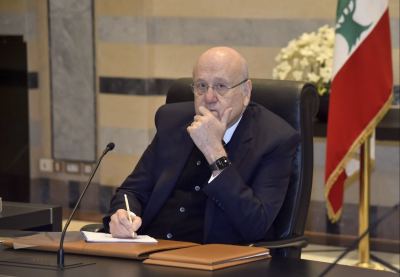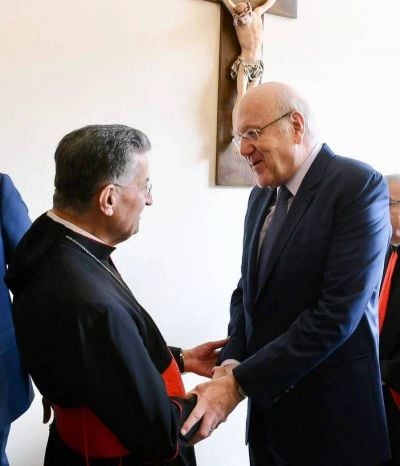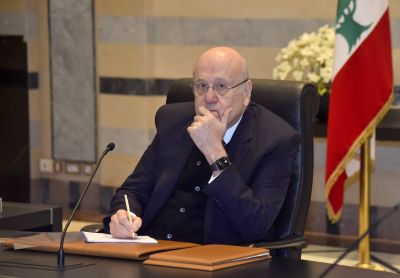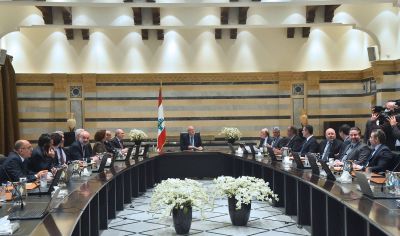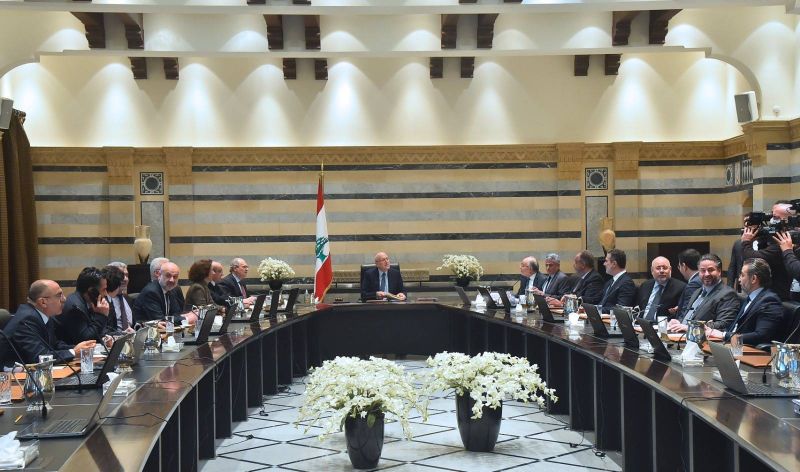
Cabinet meeting chaired by caretaker Prime Minister Najib Mikati (center) at the Grand Serail in Beirut on Feb. 27, 2023. (Credit: Dalati and Nohra)
Najib Mikati's caretaker cabinet, which has been serving in this capacity for the past nine months, did not on Monday move to extend the mandate of the Director of General Security Abbas Ibrahim, which expires on March 2.
The pressing matter, which is presenting difficulties in the absence of a head of state, was not on the agenda of the cabinet meeting that took place this morning at the Grand Serail but was discussed by the ministers who participated in the meeting.
Extending Ibrahim's term of office through Parliament was initially considered, but this option failed, as Parliament Speaker Nabih Berri resolved not to convene the country's MPs in the face of a likely boycott of the session by Christian parliamentarians.
The cabinet also approved several "urgent" measures on its eight-point agenda, including a line of credit to the state-owned telecom operator Ogero and transportation allowances for teachers consisting of five liters of gasoline per day.
Several ministers deemed close to the Free Patriotic Movement of Gebran Bassil once again boycotted the cabinet meeting on the ground that they reject such meetings taking place in the absence of a president of the republic.
'We are not anyone's trash'
"Let everyone fulfill their responsibilities," Mikati told L'Orient-Le Jour shortly after the end of the cabinet meeting, commenting on the issue of Ibrahim's mandate. "We are not anyone's trash," he said. When asked about Ibrahim's fate after March 2, he simply said: "We will advise when the time comes."
In an interview with the Al Jadeed TV channel, the caretaker prime minister stated that the decision to extend Ibrahim's term "should come from the Parliament."
"The civil service law stipulates that any civilian civil servant — like Abbas Ibrahim — should retire at the age of 64. Only Parliament is competent to amend the laws," he explained, assuring that any solution "will in no way go against the legal texts."
"The cabinet can do nothing" about the extension of the mandate of the director of General Security," caretaker Information Minister Ziad Makari said at a press briefing after the meeting. "This matter does not concern the cabinet," he added. "It is an administrative measure in the hands of the caretaker interior minister," he continued, noting that the latter "did not speak about it during the meeting."
Since the end of the mandate of President Michel Aoun on Oct. 31, the Parliament powers are limited to only meeting to elect his successor. Berri tried to organize a meeting focused on a number of other issues under what he calls "the legislation of necessity"; however, the main Christian parliamentary groups, and others in the opposition, opposed this move and no meeting was held.
Telecoms, education and security
At the end of Monday's cabinet meeting, which lasted about two hours, the caretaker government also granted Ogero a line of credit from the Treasury amounting to LL469 billion to cover the salaries of the operator's employees during the first half of 2023. These employees have been protesting regularly to demand an increase in their rate of pay, given the lira's more than 90 percent loss of value against the US dollar on the parallel market over the past three years.
A proposal by the caretaker education minister to provide teachers with transportation allowances of five liters of gasoline for each working day was also approved at Monday's session. This measure will be implemented in coordination with the ministries of finance, education and energy. Caretaker Education Minister Abbas Halabi expressed hope that public school teachers will lift a strike ongoing since the start of the year in light of Monday's decision. He also assured that he "has a plan to compensate [for missed classes] in public schools" and said that "official exams will not be canceled. Also on the educational front, Makari announced that more than 60 adjunct and senior teachers will be appointed to the Lebanese University. This item was not on the agenda.
The cabinet also approved a request from the Higher Relief Committee to continue inspection work on infrastructure damaged by the Feb. 6 earthquake in Turkey and Syria, which killed more than 50,000 people in the two countries and was strongly felt in Lebanon. This will be done by the municipalities, and an advance, the amount of which was not specified, has been requested to cover the costs, Makari announced.
Makari also said that the issue of "transport allowances in the public sector, those of the military and other allowances in public administration and the Cooperative of Civil Servants, has been postponed."
"A crisis cell at the Finance Ministry has been formed to study these points scientifically," he added.
An item concerning the exemption of certain medicines from customs duties was not discussed.
"The cabinet could meet again in two weeks, on March 13 or 14," Makari said, without mentioning the agenda that would be discussed at the meeting.
Meetings of the caretaker cabinet in the midst of the presidential vacuum are controversial and contested by several parties, including the FPM, which accuses Mikati of asserting the prerogatives of the head of state. During the last three meetings, the cabinet approved several measures, including the allocation of aid to the education system and the medical sector.
Lebanon's dues to international organizations
The government also approved the opening of a $50 million loan, with a 4% interest rate, to pay Lebanon's dues to international organizations.
At the end of January, Beirut lost its voting rights at the UN General Assembly due to the non-payment of its dues for the years 2021/2022, which amounted to $1,835,303.
The caretaker cabinet also endorsed the calculation of state expenditures, including the payment of public sector salaries, on the basis of a constitutional budget deadline extension rule.
According to the constitution, the state is granted an additional month to adopt an annual budget if MPs fail to agree on the text before Dec. 31.
During this additional month, expenditures and revenues are executed in the same way as the January of the previous year.
However, this rule is being broadly interpreted by the Lebanese authorities.
Read more:
Lebanon’s civil servants are leaving in droves. They won't be replaced soon
The budget for the fiscal year 2023 has not yet reached the draft stage, which must be prepared by the Finance Ministry before being presented to cabinet.
Mikati and the judiciary
At the beginning of the meeting, Mikati said that its purpose was to "manage urgent matters for the Lebanese and to ensure the functioning of public services." Regarding the tug of war between some private banks and the Prosecutor General of the Court of Cassation of Mount Lebanon, Ghada Aoun, Mikati denied any interference in the work of justice.
"We assured in our ministerial statement that we respect the judiciary and do not interfere in its work. But there are some cases related to the supreme interest of Lebanon …," he stressed. "No one should think that we are protecting a person or groups. Our objective is to protect the banking sector," he added, while he is known for his regular defense of the governor of the Banque du Liban, Riad Salameh.
Mikati had asked caretaker Interior Minister Bassam Mawlawi not to implement the decisions taken by Judge Aoun against several banks. This interference by the executive branch in judicial affairs has been widely denounced, particularly by the Higher Judicial Council, which has demanded that the prime minister and the interior minister reverse their positions, something Mikati has refused to do.
